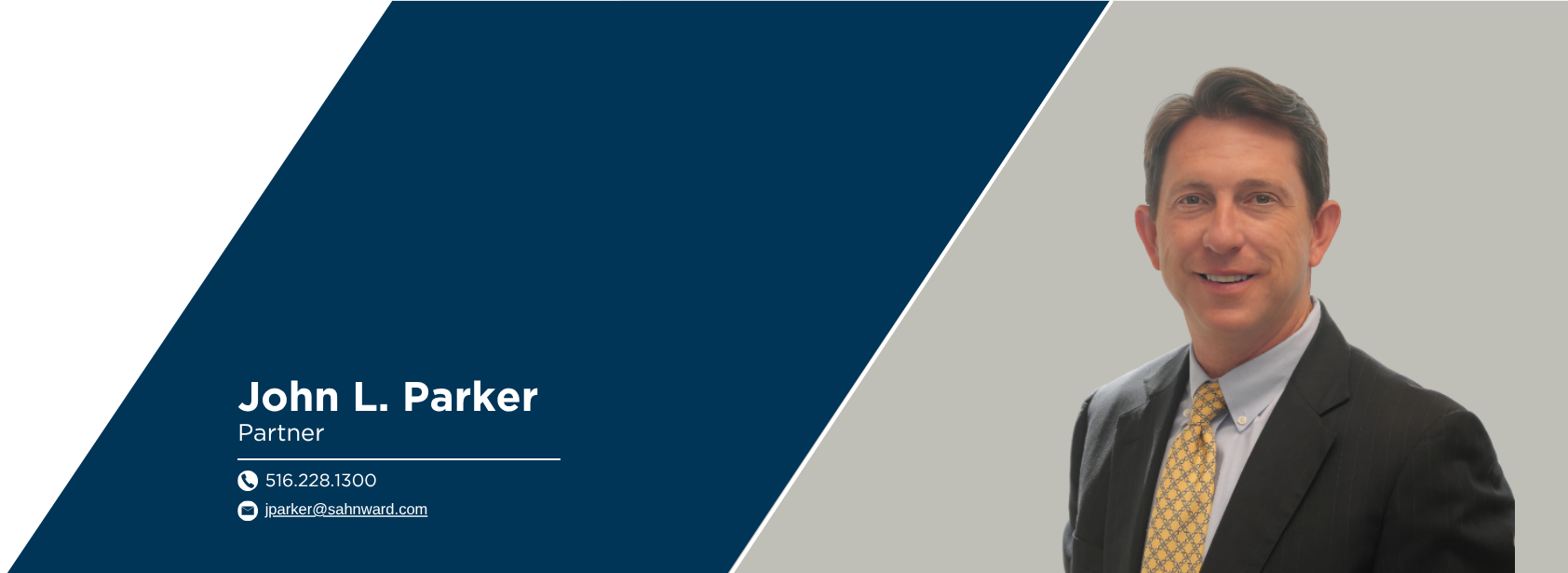John Louis Parker is the Environmental, Energy, and Resources Practice Group Partner with Sahn Ward Braff Coschignano PLLC.
John has been an environmental attorney for over twenty-five years. He brings a wealth of experience and specialized environmental expertise in matters involving the Environmental Conservation Law and regulations, Clean Water Act enforcement, and the Navigation Law, including contaminated site remediation, Superfund litigation, and brownfield redevelopment. John represents clients in environmental litigation matters in State and Federal court, as well as administrative compliance and enforcement matters and permitting proceedings. John represents clients in SEQRA reviews as well as Article 78 proceedings.
In June 2025, John accepted the nomination to become Secretary of the Environmental and Energy Law Section of the New York State Bar Association. In this role, John will expand his statewide leadership role as a member of Section’s Cabinet. John serves the Section as the Chair of the Legislation Committee and he is also a member of its Executive Committee. Each Spring, John leads the Annual Legislative Forum in Albany. In 2017, he received the prestigious Section Council award.
In June 2025, John accepted the nomination to become a member of the Board of Directors of the Nassau County Bar Association. He also serves as the Chair of the Environment Law Committee.
In 2021, 2022, 2023, 2024, and 2025, he was selected to the list of New York Metro Super Lawyers.
Mr. Parker served as the Regional Attorney at the New York State Department of Environmental Conservation (NYSDEC) for the Lower Hudson Valley, Catskill Region. His role as general counsel and chief legal representative was expansive, leading enforcement and compliance efforts in numerous regulatory programs. Some examples of these programs were clean water, clean air, solid waste, petroleum, pesticides, and the superfund and brownfields remedial programs. He also worked extensively on many environmental permitting matters and on significant SEQRA reviews.
He began his legal career as Counsel to the Chairman of the State Assembly Environmental Conservation Committee. While serving in that role, he worked on complex investigations including a review of the efforts to clean the Hudson River under the Superfund program and he developed policy and legislative proposals on a variety of environmental topics. These efforts led to the drafting and negotiating of the first comprehensive brownfields legislation in New York State, the predecessor to legislation creating the state’s brownfield redevelopment law.
Mr. Parker’s leadership roles in significant environmental initiatives in the New York City Metropolitan Region and the Hudson River Valley involve clean water and climate change issues. He has also served as Director of Legal Programs at Riverkeeper.
Mr. Parker has written articles for The New York Environmental Lawyer of the Environmental and Energy Section of the New York State Bar Association. Previously, he published a quarterly column on regulatory and compliance issues at the NYSDEC during his tenure there.
He has authored numerous publications in professional journals, law reviews, including the Environmental Law Practice Series. These articles have focused on emerging contaminants, corporate disclosure, hazardous waste and hazardous substances, environmental remediation, climate change, energy law, and environmental governance in New York.
John’s public speaking engagements routinely address a number of key environmental and energy law issues – from extreme weather to the siting of battery energy storage systems.
Mr. Parker’s numerous professional articles include:
- Extreme Weather Events Are Changing Communities, and the Insurance Industry, as They Respond to the Ongoing and Costly Climate of Change, NY Environmental Lawyer, September 22, 2025
- New York’s New View of Freshwater Wetlands Regulation: Legal and Regulatory Authority Substantially Increases, Nassau Lawyer, September 1, 2025
- Rechargeable Batteries Required for Renewable Energy Success, Nassau Lawyer, February 1, 2025.
- Taking Stock: Addressing Climate Change and Environmental Sustainability, NY Environmental Lawyer, October 1, 2024.
- Back to the Future: SCOTUS Undoes 40-year Precedent, Nassau Lawyer, September 1, 2024.
- Meeting the Challenges of New York’s Energy Future, NY Environmental Lawyer, October 26, 2023.
- New York State Climate Leadership, Fall 2022.
- Environmental Law and Regulation in NY, 2022–2024 Supplement (Thomson Reuters).
- Lessons from the NY Waterfront, Environmental Claims Journal, July 28, 2017.
- Implementing Environmental Law, IUCN, 2015.
- Assessing Environmental Governance of the Hudson River Valley, Pace Envtl. L. Rev., 2014.
- The NY Environmental Selfie, Spring 2014.
- Extreme Weather and Its Consequences, 2013 (Parts 1 & 2).
- DEC Updates, 2009 – 2012.
- Indian Point Nuclear Facility Evacuation Plan, 2002.
- Missed Opportunities: Energy Policy & NYPA, Pace Envtl. L. Rev., 2002.
- Enhancing Remediation via Superfund/Brownfields, Fordham Envtl. L. J., 2000.
- Eco-labeling in Sustainable Forest Management, UO Envtl. L. J., 1996.
Mr. Parker’s professional engagements include:
- Dean’s Hour: Battery Storage Challenges, NCBA, Nov 18, 2024.
- Dean’s Hour: SCOTUS Analysis, NCBA, Sept 10, 2024.
- SEQRA: Segmenting Review, NCBA, Oct 25, 2023.
- Battery Storage & LI Communities, NCBA, Feb 1, 2023.
- Environmental Crimes Detection Conf., 2010–2011.
- NY Sea Level Rise Task Force, Nov 2010.
Mr. Parker’s professional commentaries include:
- Earth Day ’24: Climate Risk, Innovate LI, Apr 22, 2024.
- Earth Day: Sustainability, LI Life & Politics, Apr 22, 2024.
- Uncertainty after WV v. EPA, Nassau Lawyer, Sept 2022.
- COP 26: Last Chance for Long Island, Innovate LI, Oct 26, 2021.
Mr. Parker’s lectures include:
- Planning for Climate Change, Rockland Planning Federation, Oct 2010.
- NY Climate Change Law Update, Pace Law CLE, Fall 2009.
- Intro to Environmental Law, NYSBA, Fall 2007.
Mr. Parker is admitted to practice before the United States Supreme Court; United States District Courts for the Southern and the Eastern District of New York; and New York and Connecticut State Courts.
He received a Bachelor of Science from Rutgers University (Cook College) and his Juris Doctor degree from Pace Law School, where he specialized in environmental law and international law.
